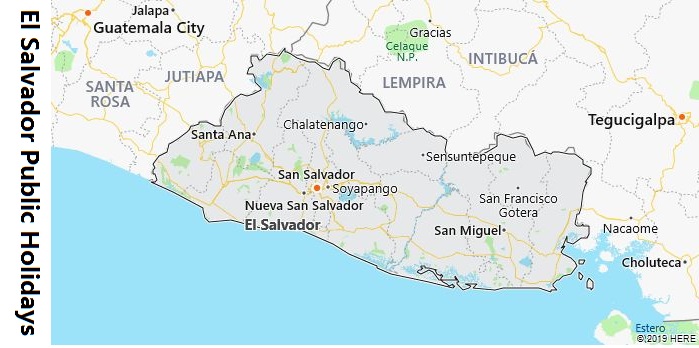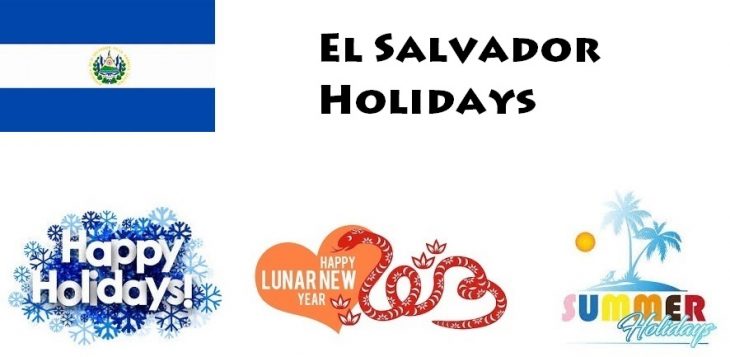El Salvador Public Holidays
El Salvador Public Holidays
Searching for the national holidays in El Salvador? All public holidays in El Salvador are treated like Sundays. This means that most of the El Salvador employees have a day off and all schools are closed on these office holidays. If you are planning a trip to El Salvador and want to know what the national and regional holidays are, check the details in the tables below.
El Salvador, located in Central America, has a rich history, influenced by its indigenous cultures, Spanish colonial legacy, and modern independence. The public holidays in El Salvador reflect the country’s religious traditions, historical milestones, and cultural celebrations. With a predominantly Roman Catholic population, many of the holidays in El Salvador are centered around Catholic feasts, while others commemorate the country’s struggles for independence and sovereignty. These holidays offer a chance for reflection, cultural expression, and national pride. Public holidays in El Salvador are celebrated with a variety of events ranging from solemn religious observances to lively festivals, uniting people from all regions in shared experiences.
National Holidays in El Salvador
1. New Year’s Day (Día de Año Nuevo) – January 1
Date: January 1
Description: New Year’s Day in El Salvador is a national holiday that marks the beginning of the new year. It is celebrated with family gatherings, parties, and festivities. The day is marked by reflection on the past year and setting goals for the year ahead. Many people attend special church services, and there is often an atmosphere of renewal. Government offices, schools, and most businesses are closed for the day, making it a day of rest for Salvadorans.
Observance: Nationally
Days Off: 1
2. Day of the Holy Family (Día de la Sagrada Familia) – First Sunday after Christmas
Date: First Sunday after Christmas (December 26)
Description: The Day of the Holy Family celebrates Jesus Christ’s birth and the sacredness of the family unit. This holiday is significant in El Salvador, where many families come together to celebrate not just the birth of Christ but also the unity and strength of the family as the cornerstone of society. The day is marked with church services, prayers, and family-oriented activities.
Observance: Nationally
Days Off: 1
3. Good Friday (Viernes Santo) – Varies (March/April)
Date: Varies (March/April)
Description: Good Friday is a solemn Christian holiday that commemorates the crucifixion of Jesus Christ. In El Salvador, it is observed with solemn religious services, processions, and periods of reflection on Christ’s suffering and sacrifice. The holiday is marked by many Salvadorans attending church services, and the day is considered one of the most significant religious observances in the country. Public life comes to a standstill, with government offices and businesses closing in observance.
Observance: Nationally
Days Off: 1
4. Holy Saturday (Sábado Santo) – Varies (March/April)
Date: Varies (March/April)
Description: Holy Saturday is part of the Holy Week observances in El Salvador and marks the day that Jesus Christ is believed to have laid in the tomb. It is a time of reflection, prayer, and anticipation for Easter Sunday, the day of Christ’s resurrection. In El Salvador, many people spend Holy Saturday in quiet contemplation and religious observance, participating in Mass and other church services. While it is not as widely celebrated as Good Friday, it remains a significant day of the Christian calendar.
Observance: Nationally
Days Off: 1
5. Labour Day (Día del Trabajo) – May 1
Date: May 1
Description: Labour Day in El Salvador is celebrated in solidarity with workers around the world. The day honors the achievements of the labor movement and advocates for workers’ rights and social justice. In El Salvador, it is marked by parades, protests, and gatherings organized by trade unions and political groups. It is a day to recognize the importance of labor in shaping society and to call attention to ongoing issues related to workers’ rights. Most businesses, government offices, and schools are closed, giving people the opportunity to participate in these activities.
Observance: Nationally
Days Off: 1
6. Independence Day (Día de la Independencia) – September 15
Date: September 15
Description: Independence Day marks the anniversary of El Salvador’s declaration of independence from Spain in 1821, along with the other Central American nations. The day is a patriotic celebration with parades, flags, dances, and speeches, particularly in the capital city of San Salvador. Independence Day is a time for Salvadorans to reflect on the country’s history, sovereignty, and achievements. National pride is at the forefront, and many families gather for festivities and community events.
Observance: Nationally
Days Off: 1
7. Columbus Day (Día de la Raza) – October 12
Date: October 12
Description: Columbus Day is a holiday that celebrates the arrival of Christopher Columbus in the Americas in 1492, though it is a more controversial holiday for many in Latin America due to the negative impacts of European colonization on indigenous populations. In El Salvador, it is a day for reflecting on the country’s colonial past and celebrating cultural diversity. Some observe it with educational activities or cultural events, while others see it as an opportunity to reflect on the legacy of colonization.
Observance: Nationally
Days Off: 1
8. Christmas Day (Navidad) – December 25
Date: December 25
Description: Christmas Day in El Salvador is a Christian holiday that celebrates the birth of Jesus Christ. It is one of the most important holidays in the country, celebrated with family gatherings, festive meals, and church services. Christmas traditions include singing Christmas carols, attending Mass, and enjoying special meals like tamales and “pan dulce” (sweet bread). In addition to religious observances, the day is also a time for giving gifts and sharing with loved ones. Most businesses, schools, and government offices close for the day, allowing people to enjoy the festivities.
Observance: Nationally
Days Off: 1
Religious Holidays in El Salvador
1. Feast of Our Lady of Peace (Fiesta de Nuestra Señora de la Paz) – January 21
Date: January 21
Description: The Feast of Our Lady of Peace is a significant religious holiday in El Salvador, especially for those in the city of San Salvador. The day honors the Virgin Mary under the title of Our Lady of Peace, the patroness of El Salvador. This day is marked by religious processions, Masses, and celebrations in various communities, especially in the capital. Many Salvadorans visit churches to pray and seek blessings from the Virgin Mary.
Observance: Nationally, particularly in San Salvador
Days Off: 1
2. All Saints’ Day (Día de Todos los Santos) – November 1
Date: November 1
Description: All Saints’ Day is a Catholic holiday that honors all saints and martyrs. In El Salvador, it is a solemn day marked by religious observances, especially for the Catholic community. Many Salvadorans attend Mass and visit cemeteries to honor deceased family members. It is a time for reflection on the lives of those who have contributed to the faith and a moment to remember the departed.
Observance: Nationally
Days Off: 1
3. Immaculate Conception (Inmaculada Concepción) – December 8
Date: December 8
Description: The Immaculate Conception is a Catholic holiday that celebrates the belief that the Virgin Mary was conceived without original sin. In El Salvador, it is a day of devotion, with religious services held in churches across the country. People celebrate Mary’s purity and role in the Christian faith, and many attend Mass to honor the occasion. It is an official public holiday, and many businesses and government offices are closed.
Observance: Nationally
Days Off: 1
Other Key Holidays and Observances
1. Day of the Cipitío (Día del Cipitío) – March 19
Date: March 19
Description: The Day of the Cipitío is a holiday that celebrates the folkloric figure of Cipitío, a mischievous and playful character from Salvadoran folklore. The day is marked by celebrations that include local festivals, dances, and performances reflecting Salvadoran traditions. It is a time for cultural expression, particularly in rural areas where the legend of Cipitío holds strong cultural significance.
Observance: Local festivals, especially in rural areas
Days Off: Not a national public holiday but celebrated locally
2. Mother’s Day (Día de la Madre) – May 10
Date: May 10
Description: Mother’s Day in El Salvador is a special occasion to honor mothers and their role in society. The day is marked by family gatherings, gift-giving, and celebrations of motherhood. It is a time to show appreciation for mothers, grandmothers, and maternal figures in the family. The holiday is widely celebrated, with schools and businesses often observing the day.
Observance: Nationally
Days Off: Not a public holiday, but widely celebrated
3. Father’s Day (Día del Padre) – Third Sunday in June
Date: Third Sunday in June
Description: Father’s Day is a celebration to honor fathers and fatherhood in El Salvador. Similar to Mother’s Day, Father’s Day is marked by family celebrations and expressions of gratitude toward fathers. It is a time for families to gather, enjoy meals together, and celebrate the contributions fathers make to their families and society. While it is not an official public holiday, it is widely celebrated across the country.
Observance: Nationally
Days Off: Not a public holiday but widely observed
Public Holidays Observance and Work Schedule
The following table shows the public holidays, the number of days off, and which groups of people observe the holidays.
| Holiday | Date | Days Off | Groups Observing |
|---|---|---|---|
| New Year’s Day (Día de Año Nuevo) | January 1 | 1 | Nationally |
| Day of the Holy Family (Día de la Sagrada Familia) | First Sunday after Christmas | 1 | Nationally |
| Good Friday (Viernes Santo) | Varies (March/April) | 1 | Nationally |
| Holy Saturday (Sábado Santo) | Varies (March/April) | 1 | Nationally |
| Labour Day (Día del Trabajo) | May 1 | 1 | Nationally |
| Independence Day (Día de la Independencia) | September 15 | 1 | Nationally |
| Battle of Pichincha (Batalla de Pichincha) | May 24 | 1 | Nationally |
| Christmas Day (Navidad) | December 25 | 1 | Nationally |
| Boxing Day (Día de San Esteban) | December 26 | 1 | Nationally |
| St. Joseph’s Day (Día de San José) | March 19 | 1 | Catholic communities |
| All Saints’ Day (Día de Todos los Santos) | November 1 | 1 | Catholic communities |
| Immaculate Conception (Inmaculada Conceição) | December 8 | 1 | Catholic communities |
| Day of the Cipitío (Día del Cipitío) | March 19 | 0 | Local festivals (rural areas) |
| Mother’s Day (Día de la Madre) | May 10 | Not official, but widely celebrated | |
| Father’s Day (Día del Padre) | Third Sunday in June | Not official, but widely celebrated |















































